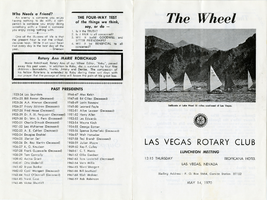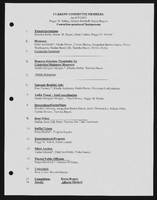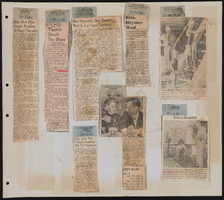Search the Special Collections and Archives Portal
Search Results

The Wheel Las Vegas Rotary Club newsletter, May 14, 1970
Date
Archival Collection
Description
Text
Hazel Baker Denton Papers
Identifier
Abstract
Hazel Baker Denton Papers (1907-1957) contain correspondence, family artifacts, scrapbooks, newspaper clippings, and family biographical information. Included are journals that chronicle the years Denton served as an Assemblywoman for the Nevada State Legislature and a copy of her book, Ironing Day, her newspaper columns, and speeches.
Archival Collection
Tony Wuehle Collection
Identifier
Abstract
The Tony Wuehle Collection documents the activities of freelance writer, college president, and poker expert Edwin "Tony" Wuehle of Michigan and Las Vegas, Nevada, between the years of 1950 to 2007. The collection consists of copies of Wuehle's regular columns, newsletters, and special articles as they were published in various journals and newspapers, especially those related to poker, the International Home and Private Poker Player's Association (IH3PA), education administration, and religious concerns.
Archival Collection
Jarbidge, Nevada Community Archives Collection
Identifier
Abstract
The Jarbidge, Nevada Community Archives Collection contains scanned images from seven archival collections and document the community of Jarbidge, Nevada from approximately 1910 to 2006. The materials were collected from various families living in Jarbidge in 2006 as part of a project led by Carrie Townley Porter. The images depict early Jarbidge structures, surrounding landscape, the Elkoro Mine, and residents of the area. Also included are images of certificates, correspondence, and newspaper articles relating to the families' histories. Also included in the collection are written summaries of ten oral history interviews of Jarbidge residents conducted in 2006. This collection contains digital surrogates only; the owners and Jarbidge Community Archives retain the originals.
Archival Collection
University of Nevada, Las Vegas School of Architecture Records
Identifier
Abstract
The University of Nevada, Las Vegas School of Architecture Records (1980-2011) include marketing material, curriculum development material, student letters to the Nevada legislative counsel, journals, newspaper clippings, and architectural drawing sets for the school building's construction.
Archival Collection

Transcript of interview with Gilbert D. Yarchever by Claytee White, 2006
Date
Archival Collection
Description
Gilbert Yarchever was one of nine siblings, born and bred in Pittsburgh, Pennsylvania. He describes the way his mother?s family was granted the last name of ?Kurfeersf" by Emperor Franz Joseph (of Austria-Hungary), explains the Seder (the Jewish observation of the exodus of Hebrews from Egypt), and tells what it was like to survive the Depression. Gilbert describes the jobs he held after high school and the government examination he took that led to his lifetime of adventure and travel. He moved to Washington, D.C., in 1940 and kept himself busy working for the government and taking classes at George Washington University, as well as working part time at Hecht Department Store and as a freelance court reporter. Following the attack on Pearl Harbor in 1941, Gilbert was sent to Africa on a merchant ship, helped smuggle Jewish survivors into Jerusalem, and was assigned the task of negotiating with Arab sheikhs for laborers to build a road. In the years after that, he worked in Europe, Panama, Alaska, Japan, and Hawaii and describes many of the jobs he was responsible for and many of the individuals he met. He also married and had children, kept up with university classes whenever he could, and collected art objects and paintings. Following his retirement in 1977, Gilbert and his family came to Las Vegas and bought a condo in Regency Towers. He did some consulting work for a couple of years, and then he and his wife began traveling around the states and going abroad. He was involved with UNLV?s EXCEL program, the music department, and the Las Vegas Art Museum. (He and his second wife Edythe presented the first major exhibition on Holocaust art at the museum.) These days Gilbert often donates pieces from his art collection to churches, synagogues, and charitable organizations.
Gilbert Yarchever was in the Navy during World War II, helped smuggle Jewish refugees into Jerusalem, worked as a civil servant in many countries, and moved to Las Vegas in 1977. He helped found the EXCEL program at University of Nevada, Las Vegas and was an art collector with his wife, Edythe Katz-Yarchever.
Text

Interview with Joyce Anne (Reese) Parkhurst, November 27, 2004
Date
Archival Collection
Description
Text

Roadrunners Internationale A-12 session, October 5, 2005
Date
Archival Collection
Description
Text

Alpha Kappa Alpha Sorority, Theta Theta Omega Chapter committee chairs and members list
Date
Archival Collection
Description
From the Alpha Kappa Alpha Sorority, Incorporated, Theta Theta Omega Chapter Records (MS-01014) -- Chapter records file.
Text

